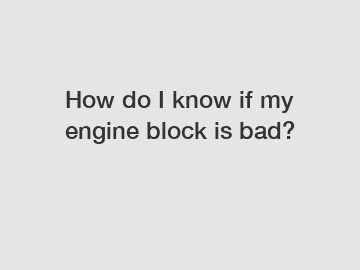How do I know if my engine block is bad?
When it comes to the overall health of your vehicle's engine, the engine block serves as its foundation. The engine block is responsible for housing several crucial components that make up the heart of your car, including the cylinder walls, pistons, and crankshaft. Any issues with the engine block can have a significant impact on your vehicle's performance and longevity. In this blog post, we will explore the signs that indicate a faulty engine block and offer insights on what steps you can take to address the issue.
1. Unusual Engine Noises:
One of the most common signs of a problematic engine block is unusual noises emanating from beneath the hood. If you hear knocking, banging, or tapping sounds, it could be an indication of a cracked or damaged engine block. These noises are caused by a lack of lubrication or metal-on-metal contact, which can result in serious damage to the block if left unaddressed.

2. Overheating Issues:
Engine blocks are engineered to handle extreme temperatures. However, if your engine starts to overheat frequently, it could be a sign of a failing block. A cracked or warped engine block can lead to coolant leaks, resulting in inefficient cooling and increased engine temperature. Regularly monitoring coolant levels and checking for any leaks can help detect potential engine block issues in advance.
3. Poor Performance:
An engine block in poor condition can have a detrimental effect on your vehicle's overall performance. If you notice a sudden drop in power, a decrease in fuel efficiency, or difficulty starting your car, it may suggest an underlying problem with the engine block. Issues like warped cylinder walls or damaged pistons can disrupt the combustion process, leading to a noticeable loss in performance.
4. Leaks and Oil Consumption:
A faulty engine block can often lead to oil leaks, a situation in which the engine starts to consume excessive amounts of oil. These leaks can be a result of cracks or fractures in the block, compromising its structural integrity. Regularly checking for oil stains beneath the vehicle, as well as monitoring oil levels, can give you frequent clues about the condition of your engine block.
5. White Exhaust Smoke:
Excessive white smoke from your car's exhaust can be another sign of a bad engine block. This symptom often points to a coolant leak caused by a cracked block or a damaged head gasket. Coolant mixing with the combustion process leads to white smoke being emitted from the tailpipe. If you notice white smoke accompanied by a sweet or unusual odor, it is crucial to have your engine block inspected immediately.
Conclusion:
A healthy engine block is vital for your vehicle's overall performance and longevity. Being aware of the signs that indicate a bad engine block can help you address issues in a timely manner, potentially preventing more extensive and expensive damage. Remember to listen for unusual engine noises, pay attention to overheating issues, watch for poor performance, check for leaks and oil consumption, and be vigilant of white exhaust smoke. Regular maintenance, including timely inspections and prompt repairs, can help ensure that your engine block remains in optimal condition for years to come.
For more Kubota Engine Exporter, swafly machinery, kubota v3800 engineinformation, please contact us. We will provide professional answers.


